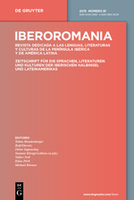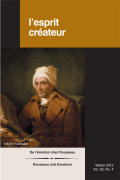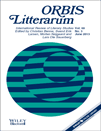
LITTERATURES
Scope & Guideline
Unveiling the Layers of Literary Meaning
Introduction
Aims and Scopes
- Exploration of Memory and Identity:
Many articles delve into themes of memory, particularly how literature shapes and reflects personal and cultural identities. This focus on memory connects authors like Georges Perec with broader narratives of personal and collective recollection. - Interdisciplinary Approaches to Literature:
The journal emphasizes interdisciplinary analysis, integrating perspectives from history, philosophy, and cultural studies. This is evident in papers discussing the interplay between literature and other art forms, particularly music and visual arts. - Ecocritical Perspectives:
Recent publications indicate a growing interest in ecocriticism, examining how literature engages with ecological themes and the representation of landscapes, as seen in discussions of Romain Gary's works. - Literary Criticism and Theory:
The journal features robust literary criticism and theoretical explorations, analyzing the works of significant authors such as Henri Bosco, Proust, and Faulkner, often linking their narratives to broader literary movements. - Historical Contextualization of Literature:
There is a consistent emphasis on placing literary works within their historical contexts, exploring how socio-political factors influence literary creation and reception.
Trending and Emerging
- Intersections of Literature and Environment:
An increasing number of articles explore the relationship between literature and ecological concerns, emphasizing how narratives reflect environmental issues and human interactions with nature. - Personal Narratives and Autobiographical Elements:
There is a growing trend towards examining personal narratives and autobiographical elements in literature, particularly how they contribute to broader themes of identity and memory, as seen in the works of contemporary authors. - Cultural and Historical Contexts in Literary Analysis:
Recent publications demonstrate a heightened focus on the cultural and historical contexts surrounding literary works, emphasizing how these factors shape narratives and authorial intent. - Contemporary Adaptations and Reinterpretations:
The journal is increasingly featuring discussions on contemporary adaptations of classic texts, showcasing how modern interpretations resonate with current societal issues and themes. - Focus on Minority Voices and Diverse Perspectives:
A notable trend is the inclusion of minority voices and diverse perspectives in literature, with articles highlighting authors from various cultural backgrounds and their contributions to the literary landscape.
Declining or Waning
- Traditional Gender Roles in Literature:
Earlier articles often explored traditional portrayals of gender in literature; however, there has been a noticeable decline in this focus, replaced by more nuanced discussions of gender identity and intersectionality. - Classical Literary Canon:
The journal has shifted away from a primary focus on classical authors and texts, such as Shakespeare and the traditional canon, towards more contemporary and diverse literary voices. - Purely Theoretical Literary Analysis:
There has been a decrease in articles that solely focus on theoretical frameworks without connecting them to specific texts or cultural contexts, indicating a move towards more applied literary criticism. - Metaphysical and Abstract Themes:
Themes that delve into metaphysical or abstract literary discussions are less prevalent, suggesting a preference for more tangible, narrative-driven analyses.
Similar Journals

CESKA LITERATURA
Illuminating the Significance of Czech Literature in TheoryCESKA LITERATURA is a prestigious peer-reviewed journal dedicated to the exploration and analysis of Czech literature and its role within the broader spectrum of literary theory. Published by the Czech Academy of Sciences, Institute of Czech Literature, this journal has established itself as a vital resource for scholars and practitioners in the field since its inception. With an impact factor that reflects its influence, CESKA LITERATURA provides open access content since 2021, ensuring wider dissemination and accessibility of research findings. The journal aims to foster interdisciplinary dialogue and engage with contemporary literary discourse while covering a range of topics from historical studies to modern literary critiques. With a proud heritage from 2002 to 2024, CESKA LITERATURA holds a notable position, categorized in the Q3 quartile in Literature and Literary Theory for 2023, and ranked #458 out of 1106 in the Scopus database, highlighting its relevance and contribution to the arts and humanities domain. Scholars and students interested in deepening their understanding of Czech literature and contributing to its ongoing discussion are encouraged to explore the rich array of articles and insights available in this important publication.

IBEROROMANIA
Exploring the Depths of Romance Linguistics and LiteratureIBEROROMANIA, published by WALTER DE GRUYTER GMBH, stands as a pivotal journal in the fields of Linguistics and Language and Literature and Literary Theory. Since its inception in 1969, IBEROROMANIA has facilitated scholarly discourse by providing a platform for cutting-edge research that explores the complexities of Romance languages and their literatures. The journal is recognized for its valuable contributions, currently holding a Q3 quartile ranking in Linguistics and Language and a Q2 ranking in Literature and Literary Theory as of 2023. With its diverse scope spanning several years, including works from 1970 to 2024, IBEROROMANIA is pivotal for researchers, professionals, and students alike, fostering a deeper understanding of Romantic linguistic and literary frameworks. Although it does not provide open access, its impact in the Arts and Humanities is underscored by its Scopus rankings, reflecting a commitment to high-quality scholarship. For those dedicated to exploring the nuances of Romance languages and literature, IBEROROMANIA is an indispensable resource.

Teksty Drugie
Exploring the Depths of Literary TheoryTeksty Drugie is a premier academic journal dedicated to the field of Literature and Literary Theory, published by the Polish Academy of Sciences, Institute of Literary Research. With its issuance beginning in 2008 and extending intermittently to 2020, this journal has been a significant contributor to literary scholarship in Poland and beyond. The journal holds a commendable Q2 ranking in its category for 2023, indicating its influential status amongst peers in the Arts and Humanities realm, and an impressive Scopus rank of #736 out of 934 in the Literature and Literary Theory domain, with a 21st percentile ranking. Researchers and students will find this journal invaluable for its rigorous academic standards and insightful contributions to contemporary literary discourse. While traditionally available through subscription, Teksty Drugie remains an essential resource for those engaged in the study of literature, offering critical theoretical perspectives and a forum for scholarly debate. The journal is located at ul. Nowy Świat 72, Pałac Staszica, Room 1, Warszawa 00-330, Poland.

Ermeneutica Letteraria-Rivista Internazionale
Advancing Critical Perspectives on Literature and LinguisticsErmeneutica Letteraria-Rivista Internazionale, published by FABRIZIO SERRA EDITORE, serves as a notable platform for the ongoing discourse in the fields of Arts and Humanities, Linguistics, Literature, and Literary Theory. Since its inception in 2019, this scholarly journal has become a significant reference point for innovative research while critically engaging with various literary paradigms and linguistic phenomena. Although currently classified in the Q4 quartile across its respective categories by Scopus, its commitment to open discourse invites submissions that challenge existing norms and broaden the horizons of contemporary literary critique. The journal's holistic approach not only supports the scholarly community in Italy but also aims to foster international dialogue among researchers, professionals, and students in the humanities. The journal is located in Pisa, Italy, and due to its open access policy, it seeks to ensure that knowledge is accessible to a wider audience while contributing to the collective understanding of literary interpretations and linguistic developments.

GERMANISCH-ROMANISCHE MONATSSCHRIFT
Cultivating Insights in Germanic and Romance StudiesGERMANISCH-ROMANISCHE MONATSSCHRIFT, published by UNIVERSITATSVERLAG C WINTER HEIDELBERG GMBH, is a vital academic journal dedicated to the fields of linguistics, literature, and literary theory. With its ISSN 0016-8904, this journal fosters scholarly discussions and disseminates innovative research that intersects Germanic and Romance languages and literatures. While it does not currently offer Open Access options, its contributions have positioned it within the Q4 quartile in both Linguistics and Language, and Literature and Literary Theory according to the 2023 category rankings. The journal's Scopus ranking reflects its emerging place within the academic community, situated at the 40th percentile for Literature and Literary Theory, and the 20th and 18th percentiles within Language and Linguistics, respectively. Scholars and students are encouraged to engage with this resource as it offers a platform for new perspectives that are pivotal to understanding the complex interrelations of these linguistic traditions, enriching both teaching and research initiatives.

Romanic Review
Exploring the Depths of Romance Languages and LiteratureThe Romanic Review, published by Duke University Press, stands as a significant scholarly platform in the field of Romance languages and literature. With its ISSN 0035-8118 and E-ISSN 2688-5220, this journal has been serving the academic community since its inception and will continue its contribution until 2024. Situated in the United States, it has carved out a vital niche in the Arts and Humanities, currently falling within the Q3 quartile as per the 2023 rankings. Although it operates under a traditional subscription model, its focus on disseminating critical and innovative research makes it an indispensable resource for scholars and students alike. The Romanic Review is dedicated to fostering academic discussions that bridge interdisciplinary gaps, making it a cornerstone reference for anyone engaged in the study of Romance cultures, linguistics, and literary studies.

ESPRIT CREATEUR
Fostering Scholarly Excellence in LiteratureESPRIT CREATEUR is a prestigious journal published by the Johns Hopkins University Press, renowned for its contributions to the fields of Literature and Literary Theory. Since its inception in 2002, the journal has become a vital platform for innovative scholarly discourse, achieving an impressive Q2 classification in the 2023 category rankings and a respectable rank of #546 out of 1106 in the Scopus Arts and Humanities - Literature and Literary Theory sector, situating it within the 50th percentile of the discipline. The journal's blend of critical perspectives offers readers insights into contemporary literary analysis and theory, making it essential for researchers, professionals, and students alike. Though it currently adheres to traditional access models, its commitment to fostering high-quality, peer-reviewed scholarship cements its status as a leading voice in literary studies, enhancing its role in academic research and education.

CRITICA LETTERARIA
Cultivating a Rich Dialogue in Literary ScholarshipCRITICA LETTERARIA is an esteemed literary journal published by Paolo Loffredo Iniziative Editoriali SRL that has been contributing to discussions in the field of literature and literary theory since its inception in 2009. With an ISSN of 0390-0142 and an E-ISSN of 2035-2638, this journal is indexed in Scopus, ranking in the category of Arts and Humanities under Literature and Literary Theory. It is classified in the Q4 quartile, indicating its dedication to serving a niche yet vital discourse within the broader literary community. Although currently not open access, the journal offers a platform for scholars, researchers, and students to engage with diverse literary analyses and theoretical advancements. Located in the vibrant city of Naples, Italy, CRITICA LETTERARIA aims to foster academic dialogue and promote innovative approaches in literary studies, making it an important resource for anyone passionate about navigating the complexities of literary narratives and theory.

ORBIS LITTERARUM
Elevating Understanding of Literary WorksORBIS LITTERARUM, published by Wiley, is a prestigious journal in the field of Literature and Literary Theory, aiming to foster in-depth scholarly discussions and critical analyses of literary works and their theoretical underpinnings. With its ISSN 0105-7510 and E-ISSN 1600-0730, the journal presents a rich legacy that spans several decades, having converged its publishing efforts from 1943 to 1950 and from 1954 to the present day, thus ensuring a continuity of discourse in the literary field. Recognized for its high quality, ORBIS LITTERARUM is ranked in the Q2 quartile of literature disciplines as per the 2023 metrics, placing it within the top 26% of its category and earning a favorable position in the Scopus Rankings with a percentile of 74 in the arts and humanities. Researchers, professionals, and students alike are encouraged to contribute to this esteemed journal to engage with contemporary literary debates and to influence future scholarship in literature, enhancing understanding of texts across cultures and epochs.

LITERATUR UND KRITIK
Bridging Tradition and Innovation in Literary CritiqueLITERATUR UND KRITIK, published by Otto Muller Verlag, stands as a significant journal in the field of Literature and Literary Theory. This Austrian journal, with its ISSN 0024-466X, offers a platform for critical examination, analysis, and discourse on literature from various historical and cultural contexts. Despite its current standing in the Q4 category of literature rankings, it provides an invaluable resource for researchers and practitioners committed to exploring the evolving landscape of literary criticism. This journal is particularly notable for its convergence of scholarly thought from 2009 to 2024, fostering a rich dialogue among academics, critics, and students alike. While it does not offer open access, its valuable insights into contemporary and historical literary studies make it a respected source within the academic community. The journal ensures that contributors and readers alike engage deeply with significant literary themes, nurturing both scholarly and creative pursuits.